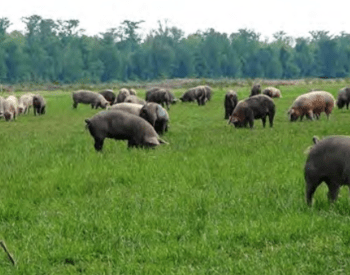Hi! I heard from a source of questionable credibility that hog operations aren't allowed to have hogs on pasture past November 1st and through the winter. I'm hoping to find more information on this.
I am involved in a small hog operation that is considering using a 4 acre plot to finish 8 hogs.
I haven’t heard of a regulation that hogs aren’t allowed on pasture during that time, but it definitely isn’t recommended. With any livestock animals, having them out on pasture during Western Oregon’s wet season is detrimental to pasture health. If animals are on wet, saturated pastures this increases mud, weeds, and animal health problems, and decreases your forage productivity.
Shelter for hogs
Hogs can be especially susceptible to cold, wet environments and their love of rooting around can destroy a pasture really quickly, so it would be important to design a shelter and overwinter area to keep them during the wet season. It is also critical to formulate a full ration for hogs and remember that they cannot survive on grass alone, especially young pigs.
Agricultural Water Quality Management Plans
The information you heard might be related to land and water quality issues related to pigs on pasture (or any animals that might destroy pasture) in the winter. This would come from the Agricultural Water Quality Management Plan for the watershed where the farm is located. These are available on the Oregon Department of Agriculture website.
The enforcement of the AgWQM rules is site-specific, so it is possible that if a landowner has had pigs on pasture in the winter and the result is a big, muddy, manure pit, then ODA can create a plan for them that says they won’t house pigs outside during a specific time frame. It wouldn’t be enforced for an entire county or area though.
Check to see what your watershed's AgWQM plan has to say about maintaining vegetation and preventing runoff into waters of the state (including road ditches and ground-water) and if so, figure out a way to manage so that you are in compliance. Regardless, provide a shelter for the hogs.
Additional resources
- Benefits and Challenges of Pasture-based Pork Production, OSU Extension
- Care and Management of New Feeder Pigs, OSU Extension
- Hogs: Pastured or Forested Production (Includes a section on overwinter areas), ATTRA Sustainable Agriculture



















